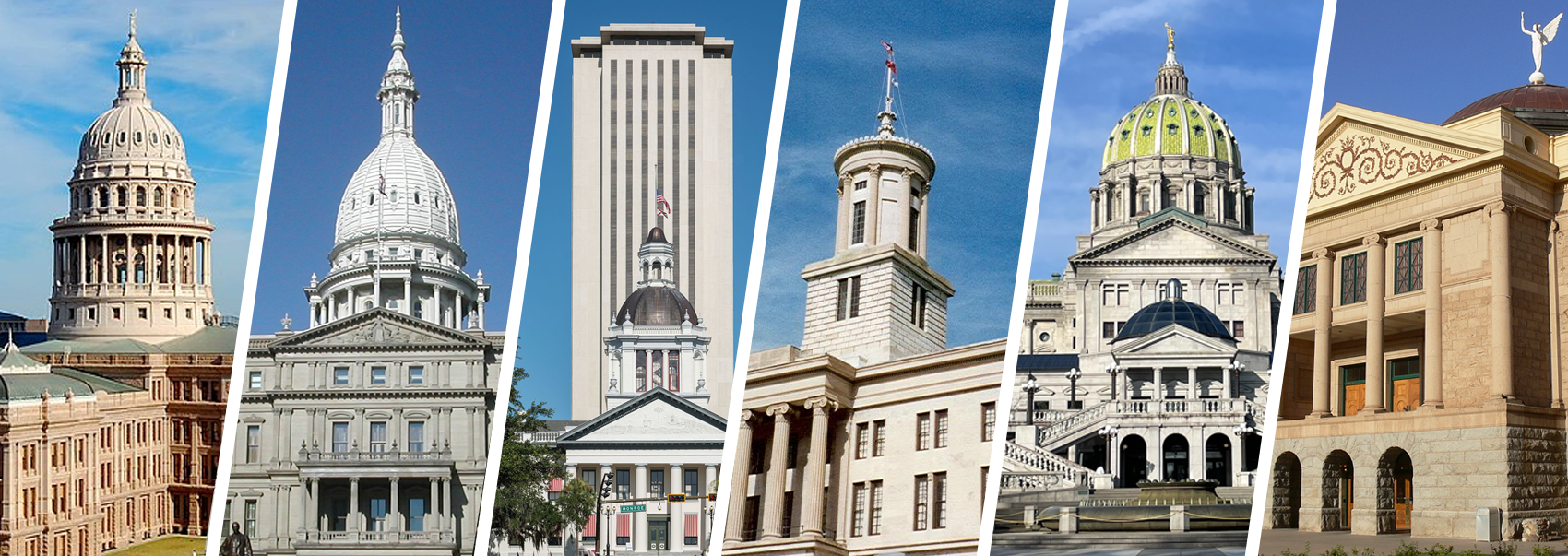
The Increased Use and Abuse of Preemption
Preemption occurs when a higher level of government (such as a state legislature) restricts or withdraws the authority of a lower level of government (such as a city council) to act on a particular issue.
Preemption is a tool, like the filibuster, that can and has been used by both political parties.
In the past, preemption was used to ensure uniform state regulation or protect against conflicts between local governments. Often, lawmakers used preemption to advance residents’ well-being and equity within communities, establishing minimum standards or “floors” for local government to build on – to tailor locally or make stronger. State civil rights laws, for example, allow cities to increase protections, but prohibit them from falling below what was required under law.
Traditional preemption emphasized balance between the state and local levels of government.
At LSSC, we believe that state preemption of local policy making should only be used to protect the health and well-being of residents, and should create the foundation upon which localities can go further in advancing equity and addressing their communities’ needs. Unfortunately, preemption today is being abused specifically to undermine a healthy democracy and harm people.
“preemption today is being abused specifically to undermine a healthy democracy and harm people.”
In recent years, preemption has been increasingly abused, leveraged to prohibit local governments from advancing policies meant to address and advance equity, public health, worker protections, climate change and so much more. In doing so, states are perpetuating harmful, oppressive systems that exclude BIPOC, LGBTQ people, women, immigrants, and working people.
The Local Solutions Support Center is committed to shining a light on these “New Preemption” laws, which block local efforts specifically to undermine a healthy democracy and harm people.
“If Americans don’t start paying closer attention to what’s happening in statehouses across the country, the Republic may never recover.”
- The NEW YORK TIMES
“GOP lawmakers are abusing a policy mechanism called state preemption to advance voter suppression efforts by restricting the authority of local election officials, and often threatening them with punitive measures for simply trying to run smooth and fair elections. This is the latest front in a decade-long effort of using preemption to take power away from people and communities and strengthen inequitable systems rooted in white supremacy.”
– Richard Briffault
“States are limiting the authority of localities without offering alternatives that tackle the issues localities are interested in. This concentrates power at the state-level where localities must rely on state legislatures to enact policies that target the needs and desires of their communities. This becomes problematic when local governments are willing but unable to address local issues and state governments are not providing any solutions either. It appears the goal of preemption is not to address problems but to maintain the status quo.”
– Courtnee Melton-Fant
Who Is Harmed By Abusive Preemption?
Research shows that preemption legislation is often passed to exclude and harm BIPOC communities, LGBTQ people, women, immigrants, and working people.
Our government and elected officials have a responsibility to meet the needs of their communities and to address the policies, institutions, and cultural barriers that perpetuate harm and continue to exclude BIPOC, LGBTQ people, women, immigrants, and working people. Abusive preemption often undermines efforts toward equity.
BIPOC: Preemption is often used to uphold racist and inequitable structures, pushed by majority-white and GOP-controlled legislatures. Two reports, Preempting Progress in the South and Preempting Progress in the Heartland, highlight this trend. Courts are also looking at the state use of preemption to perpetuate racial inequities: One lawsuit, Lewis v. Governor of Alabama, challenged Alabama’s preemption of Birmingham’s minimum wage ordinance, noting, “the disproportionate effect of the Minimum Wage Act on Birmingham’s poorest black residents; the rushed, reactionary, and racially polarized nature of the legislative process; and Alabama’s historical use of state power to deny local black majorities authority over economic decision-making.”
Women: LSSC funded research for this Partnership for Working Families report, For All of Us, By All of Us: Challenging State Interference to Advance Gender and Racial Justice, looking at the effects of preemption on women, and particularly women of color in four cities: Denver; New Orleans; Pittsburgh; and Nashville.
LGBTQ People: The Power of State Preemption: Preventing Progress and Threatening Equality, produced by LSSC and the Movement Advancement Project, exposes the coordinated effort to limit municipalities from passing local equality measures, the special interests motivating these efforts, and the negative impact specifically on LGBTQ people.
Immigrants: In 2019, prior to the pandemic, anti-sanctuary cities and anti-immigrant bills were the most commonly introduced preemption bills. This type of preemption, blatantly political in nature, is often punitive, meaning the state threatens legal action against, or the withholding of funds to, municipalities that are simply seeking to protect immigrants.
Working People: This housing preemption map details how a majority of state legislatures are using preemption laws to block local equitable housing policies, worsening the lack of affordable housing throughout the country.
Preemption Policy Areas
Here are some policy areas where preemption is commonly abused:
LABOR
Preemption is often used to harm workers by limiting localities’ ability to set stronger labor standards and protections, including those related to minimum wage, paid sick time, wage theft, local hiring, pensions, and fair scheduling.
More than half of U.S. states preempt local minimum wage laws, and many ban local paid sick day laws and fair scheduling laws. Five states have preempted local fair hiring, “Ban the Box” laws.
Housing
A serious and worsening housing crisis have prompted some local governments to advance housing policies that promote affordability, equity and opportunity. Many state governments, however, continue to block these policies from taking effect.
More than 30 states have some sort of housing-related preemption law. These include state policies blocking protections against source-of-income discrimination; the regulation of short-term rentals; inclusionary housing programs; rent regulations; and local homelessness measures.
PUBLIC HEALTH authority
Many Americans became conscious about preemption during the COVID-19 pandemic, when state and local governments had very public disputes over masks, vaccines, and stay-at-home orders.
Prior to the pandemic, states also interfered with public health in other ways. At least 10 states preempt local regulation of e-cigarettes and four ban soda taxes.
Education
Schools are at the heart of our local communities, but over the last year we’ve seen a dramatic uptick in state efforts to control schools.
This includes interfering with at-home learning resulting from the pandemic and censorship of what can be discussed in classrooms. Many states have passed legislation to censor discussion of LGBTQ people; climate change; and the role discrimination and racism has played in our history.
Immigration
Cities and municipalities have the right to enact local policies that protect their communities, including those that recognize the human dignity of immigrants. But some state lawmakers are enacting preemption laws that make it difficult for cities to offer immigrants sanctuary status.
Prior to the pandemic – anti-sanctuary cities and anti-immigrant bills were the most commonly introduced preemption bills.
TECHNOLOGY
Too often, corporations lobby lawmakers to pass laws limiting municipal control of technology in an effort to maximize their short-term revenues.
These include the 20 states that block or ban municipal broadband networks, the 44 states that ban local regulation of ride-sharing networks, and the 23 states that have banned local control over 5G technology.
ENVIRONMENTAL PROTECTION
Embracing clean and renewable energies is one of the best ways many communities can do their part to curb climate change. But the oil and gas industry have lobbied hard and successfully to pass state laws that undermine environmental protection laws.
Twenty states now preempt local bans on natural gas hook-ups. Fifteen states ban local bans on plastic bags. And local regulations around Styrofoam, energy benchmarking, and factory farming are also often preempted.
Voting Rights
Most Americans can agree that for democracy to work for everyone, it must include everyone. That’s especially true locally. But recently we’ve seen state legislatures moving to curb the long-fought for, hard-won right to vote.
New policies that prohibit same-day voter registration, block ranked-choice voting, and more are moving through legislatures and sometimes becoming law, deliberately create barriers that make it harder for BIPOC Americans, immigrants, and others to register and vote.
LOCAL POLICE BUDGETS
State legislatures have attempted to take control of local budget decisions and processes – particularly as it relates to local control of police budgets.
This sets a dangerous precedent, and it ignores the differing needs of every community. Investments in policing, education, housing, and mental health services all impact public safety and well-being. The level of investments varies community by community – and that’s one of the reasons local budget control matters.
LGBTQ Rights
Cities and municipalities are often where some of the strongest civil rights protections are enacted, including those related to LGBTQ people.
Increasingly, however, state legislatures are seeking to uphold inequitable systems by blocking local LGBTQ protections and limiting access to healthcare or curriculum related to LGBTQ people.
Firearm Regulations
Municipalities are increasingly being stripped of their ability to regulate firearms and protect their community members.
More than 40 states limit local authority to regulate guns or ammunition.
Racial Justice
From restricting local efforts to reform the criminal justice system to statewide bans on protester, many of the attempts to preempt local authority stem from a history of racism and white supremacy.
States Are Interfering in Unprecedented Ways
As the abuse of preemption has skyrocketed, extreme lawmakers are also pushing preemption through new, invasive strategies. These include:
Punishment of Locally Elected Officials & Localities
Punitive state preemption has been used most often in gun legislation, but in the 2019 legislative session, punitive measures were targeted at localities and local officials who fail to comply with anti-sanctuary laws. Punitive measures include cutting state funds and threatening fines, removal from office, or jail for local leaders.
Arizona took a punitive approach to all local laws subject to state preemption with their extensive preemption law, Arizona Statutes § 41-194.01 (enacted in March 2016 through SB 1487), effectively chilling local initiative in the state.
Overturned Ballot Elections
Abusive preemption does not just override local elected officials’ decisions. It often directly undermines the will of residents and voters.
In Tempe, AZ, a 2018 campaign finance disclosure law passed 91% to 8% but was overturned. Similarly popular local measures have also been ignored and overturned by state governments, including Austin’s 2017 defeat of Uber’s efforts to escape regulation (passed at the ballot 56% to 44%); a 2015 fracking ban in Denton, TX (passed 59% to 41%); a 2017 local hire law in Nashville, TN (passed 57%-43%); and a 2011 paid sick day law in Milwaukee, WI (passed 69%-31%).
Elimination of Local Control in One ‘Death Star’ Bill
Some states are seeking to eliminate local control of major areas of life – such as wage and workplace standards – through the passage of one bill.
Michigan, for example, passed HB4052 to prohibit local ordinances governing minimum wage, benefits, sick leave, union organizing and strikes, wage disputes, apprenticeship programs, and “ban the box” policies. An Iowa law (House File 295) preempts many labor standards as well as plastic bag regulation. In 2019, broad bills eliminating local regulation of business were introduced but failed in several states, including Florida, Texas, Pennsylvania, and West Virginia.
Preemption of Criminal Justice Reform
Particularly following the protests against racism and police brutality in 2020, states have used preemption as backlash against local criminal justice reform efforts. Bills have interfered with local oversight of their police departments and undermined local authority to reallocate municipal funds from police departments to other social services. The bills have extended to target local prosecutorial discretion, too. As progressive district attorneys seek to reform a prosecutorial system that perpetuates mass incarceration, states have begun to usurp district attorneys’ authority to decline to prosecute offenses, assert concurrent jurisdiction to allow states to prosecute local criminal cases in the first instance, or single out progressive district attorneys for punishment.
These preemption bills not only prevent meaningful criminal justice reform, but they thwart the mandate from local communities.
Who Is Behind Abusive Preemption?
The efforts to consolidate power at the state level and end local authority over a wide range of issues are part of a national long-term strategy often driven by trade associations and corporate interests. Much of this effort has been orchestrated by the American Legislative Exchange Council (ALEC), an industry-funded organization made up of corporate lobbyists and a quarter of all state lawmakers that writes and distributes “cut and paste” model bills. Their strategy has succeeded at an alarming rate.
Here are some key examples of model ALEC bills that are used as the basis for many of the state preemption bills now being enacted with increased frequency:
Minimum Wage
Since 1991, ALEC has promoted a so-called “model” bill to preempt local increases to the minimum wage.
Municipal Broadband
Backed by AT&T, Verizon, and Comcast, ALEC has pushed industry-backed measures to preempt cities and counties from providing citizens with basic local broadband – and now 5G.
Sugar Taxes
Backed by the American Beverage Association, ALEC has sought to preempt cities from taxing sodas or requiring that restaurants provide nutrition information about their menus.
Sanctuary Cities
ALEC adopted a bill that effectively barred sanctuary cities by creating new crimes of “trespass” for people without federal immigration papers and allowing private suits against police if they do not “fully” enforce immigration laws.
Rent Control
Another ALEC bill would bar cities from adopting rent control measures.
Plastic Bags
This ban on local container bans concludes, “The free market is the best arbiter of the container.”
5G Wireless
ALEC readopted a 2006 model bill in 2015, just a year before some states began passing small-cell laws.
Pesticides
This ALEC bill banning local regulation of pesticide sale or use was written in 1995 and has been readopted twice since then.
Resources
LSSC and our partners have developed resources in a variety of areas designed to help advance your efforts to end state overreach and strengthen the ability of local governments to pass policies that protect health and safety and promote equity. Get started with these primers on preemption:





















